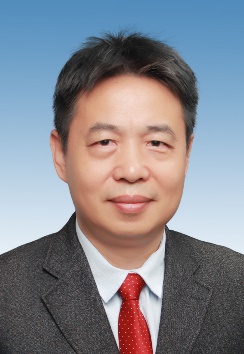
职称:教授
职务:所长
系所:纳米化学与生物学研究所
办公室:E楼201室
电话:021-66135277
E-mail: ancao@shu.edu.cn
个人简介
上海大学纳米化学与生物学研究所,教授,博士生导师;ChemMedChem国际顾问编委。长期从事蛋白质折叠和纳米生物医学研究,主要研究方向包括蛋白质折叠与设计、纳米材料与蛋白质相互作用机制、纳米材料生物功能设计以及纳米靶向载药系统等。提出了“(分子)构象工程”概念,并首次通过构象工程方法,在纳米粒子上对无活性的柔性多肽片段进行精确的构象调控而使多肽片段产生生物功能,创造了一类全新的纳米人工抗体——金抗体;提出了蛋白质结构的“限域下最低能量片段”假说与蛋白质进化的“石器时代”假说,揭示了蛋白质结构与折叠的秘密。先后主持十余项国家自然科学基金、科技部863课题及重大科技专项课题。已发表SCI论文100余篇,获国家发明专利授权20余项。2015年获上海市自然科学一等奖(排名第3),2018年获国家自然科学二等奖(排名第3),科研成果入选上海大学第一届(2016-2019)十大学术进展(排名第1),获上海大学2021年本科校级教学成果一等奖(排名第1)。
学术经历
1985-1989 浙江大学,化学系,理学学士
1992-1995 浙江大学,材料系,工学硕士
1995-1998 北京大学,化学与分子工程学院,理学博士
1998-2000 美国康奈尔大学,化学与化学生物学系,博士后
2000-2008 北京大学,化学与分子工程学院,讲师、副教授
2004年 日本大阪大学,蛋白质研究所,客座副教授
2008年至今 上海大学,纳米化学与生物学研究所,教授
研究方向
蛋白质结构与折叠机制研究
基于构象工程的纳米材料生物功能理性设计:人工蛋白质(抗体、酶等)设计
纳米生物医学:靶向纳米药物、纳米显像与诊断、纳米材料与生物界面相互作用机制
代表成果
1. 曹傲能*. 蛋白质结构的“限域下最低能量结构片段”假说与蛋白质进化的“石器时代”. 物理化学学报 2020, 36, 1907002.
2. A Cao*. The last secret of protein folding: The real relationship between long-range interactions and local structures. Protein J. 2020, 39, 422-433.
3. G-H Yan, K Wang, Z Shao, L Luo, Z-M Song, J Chen, R Jin, X Deng, H Wang*, Z Cao, Y Liu, A Cao*. Artificial antibody created by conformational reconstruction of the complementary-determining region on gold nanoparticle. PNAS 2018, 115(1), E34-43.
4. J Xu, T Gao, L Sheng, Y Wang, C Lou, H Wang*, Y Liu, A Cao*. Conformationally engineering flexible peptides on silver nanoparticles. iScience 2022, 25, 104324.
5. L Luo, Y-Y Liu, T Gao, X Wang, J Chen, H Wang*, Y Liu, A Cao*. Characterization of the specific interactions between nanoparticles and proteins at residue-resolution by alanine scanning mutagenesis. ACS Appl. Mater. Interfaces 2020, 12, 34514–34523.
6. L Li, W-S Xi, Q Su, Y Li, G-H Yan, Y Liu, H Wang*, A Cao*. Unexpected size effect: the interplay between different-sized nanoparticles in their cellular uptake. Small 2019, 1901687.
7. Y Wang, X Wang, T Gao, C Lou, H Wang*, Y Liu, A Cao*. Folding of flexible protein fragments and design of nanoparticle-based artificial antibody targeting lysozyme. J. Phys. Chem. B 2022, 126, 5045-5054.
8. W Li, T Gao, C Lou, H Wang, Y Liu, A Cao*. Biotinylated Au nanoparticle-based artificial antibody for detection of lysozyme by the lateral flow immunoassay and enzyme-linked immunosorbent assay. ACS Appl. Nano Mater. 2022, 5, 12571-12581.
9. S-T Yang, Y Liu, Y Wang, A Cao*. Biosafety and bioapplication of nanomaterials by designing protein-nanoparticle interactions. Small 2013, 9, 1635-1653.
10. A Cao*, Z Ye, Z Cai, E Dong, X Yang, G Liu, X Deng, Y Wang, S-T Yang, H Wang*, M Wu, Y Liu. A facile method to encapsulate proteins in silica nanoparticles: Encapsulated green fluorescence protein as a robust fluorescence probe. Angew. Chem. Int. Ed. 2010, 49, 3022-3025.
科研项目
作为课题负责人先后承担国家自然科学基金项目、科技部“863”计划课题及国家重点研发计划重点专项课题十余项
获奖情况
2015: 上海市自然科学一等奖一项(排名第3)
2018:国家自然科学二等奖一项(排名第3)
2021:上海大学2021年本科校级教学成果一等奖(排名第1)
2021:上海大学第一届(2016-2019)十大学术进展(排名第1)
教授课程
《化学前沿进展与机遇》(本科生通识课)
《科学欣赏与诺贝尔奖》(本科生研讨课)
《高等仪器分析》(硕士生基础专业课)
《科学道德与学术规范》(博士生基础课)
Aoneng Cao
Professor, Director
Institute of Nanochemistry and Nanobiology
Room 201, Building E
66135277 (TEL)
66135275(FAX)
ancao@shu.edu.cn
Educational Background
1985-1989 B.Sc, Department of Chemistry, Zhejiang University
1992-1995 M.Sc, Department of Material Science, Zhejiang University
1995-1998 Ph.D, College of Chemistry and Molecular Engineering, Peking University
Academic Background:
1998-2000 Postdoc, Department of Chemistry and Chemical Biology, Cornell University, USA
2000-2002 Lecturer, College of Chemistry and Molecular Engineering, Peking University
2002-2008 Associate Professor, College of Chemistry and Molecular Engineering, Peking University
2004 Visiting Associate Professor, Institute for Protein Research, Osaka University, Japan
2008- Professor, Institute of Nanochemistry and Nanobiology, Shanghai University
Research Interests:
Molecular conformational engineering
Rational design of nanomaterials as artificial proteins (antibodies, enzymes…)
Multi-functional nanomaterials for targeted drug-delivery
Mechanism of the interaction between nanomaterials and biomolecules
Selected Publications
[1] A Cao*. “Confined lowest energy structure fragments (CLESFs)” hypothesis for protein structure and the “stone age” of protein prebiotic evolution. Acta Phys.-Chim. Sin. 2020, 36, 1907002.
[2] A Cao*. The last secret of protein folding: The real relationship between long-range interactions and local structures. Protein J. 2020 39, 422-433.
[3] G-H Yan, K Wang, Z Shao, L Luo, Z-M Song, J Chen, R Jin, X Deng, H Wang*, Z Cao, Y Liu, A Cao*. Artificial antibody created by conformational reconstruction of the complementary-determining region on gold nanoparticle. PNAS 2018, 115(1), E34-43.
[4] J Xu, T Gao, L Sheng, Y Wang, C Lou, H Wang*, Y Liu, A Cao*. Conformationally engineering flexible peptides on silver nanoparticles. iScience 2022, 25, 104324.
[5] L Luo, Y-Y Liu, T Gao, X Wang, J Chen, H Wang*, Y Liu, A Cao*. Characterization of the specific interactions between nanoparticles and proteins at residue-resolution by alanine scanning mutagenesis. ACS Appl. Mater. Interfaces 2020, 12, 34514-34523.
[6] L Li, W-S Xi, Q Su, Y Li, G-H Yan, Y Liu, H Wang*, A Cao*. Unexpected size effect: the interplay between different-sized nanoparticles in their cellular uptake. Small 2019, 1901687.
[7] Y Wang, X Wang, T Gao, C Lou, H Wang*, Y Liu, A Cao*. Folding of flexible protein fragments and design of nanoparticle-based artificial antibody targeting lysozyme. J. Phys. Chem. B 2022, 126, 5045-5054.
[8] W Li, T Gao, C Lou, H Wang, Y Liu, A Cao*. Biotinylated Au nanoparticle-based artificial antibody for detection of lysozyme by the lateral flow immunoassay and enzyme-linked immunosorbent assay. ACS Appl. Nano Mater. 2022, 5, 12571-12581.
[9] S-T Yang, Y Liu, Y Wang, A Cao*. Biosafety and bioapplication of nanomaterials by designing protein-nanoparticle interactions. Small 2013, 9, 1635-1653.
[10] A Cao*, Z Ye, Z Cai, E Dong, X Yang, G Liu, X Deng, Y Wang, ST Yang, H Wang*, M Wu, Y Liu. A facile method to encapsulate proteins in silica nanoparticles: Encapsulated green fluorescence protein as a robust fluorescence probe. Angew. Chem. Int. Ed. 2010, 49, 3022-3025.
Research Projects:
Supported by multiple grants from the National Natural Science Foundation of China and the Ministry of Science and Technology of China.
Honors and Awards:
National Natural Science Award (Second Class) in 2018
Shanghai Natural Science Award (First Class) in 2015
Top-Ten-Academic-Advance (2016-2019) Award of Shanghai University
Courses:
Chemistry for Everyone (for Undergraduate Students)
Science Appreciation and Nobel Prize (for Undergraduate Students)
Advanced Instrumental Analysis (for Graduate Students)
Scientific Ethics and Academic Norms (for PhD Students)
版权所有 © 上海大学 沪ICP备09014157 沪公网安备31009102000049号 地址:上海市宝山区上大路99号 邮编:200444 电话查询
技术支持:上海大学信息化工作办公室 联系我们